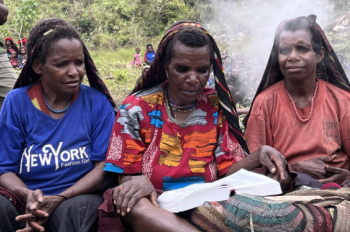
My parents came to know Christ through experiencing the kindness of Christian strangers who welcomed and cared for them when they had no means to reciprocate. This theme of strangers bringing the gospel became central to our family’s story: my parents first received it and then lived it out by caring for missionaries and international students.
Twenty years later, I too became a stranger. During a short-term internship in the Middle East, I lived among people of different ethnic and religious backgrounds, encountering real faces and souls whose struggles were often unreported in the media.
At the end of that internship, I visited a friend in Hungary, where I unexpectedly encountered hundreds of refugees camping in and outside a train station. Suitcases, clothes, and food were scattered on the ground. The scene reminded me of when Jesus saw the crowds distressed and scattered, “like sheep without a shepherd, and he had compassion on them” (Matthew 9:36). Jesus then urged his disciples to pray for God to send laborers for the harvest.
That encounter has stayed with me ever since, eventually prompting me three years later to return to the region to join a medical and refugee ministry.
Entering a different cultural context as a stranger was humbling.
Leaving familiarity behind and entering a different cultural context as a stranger was humbling. Miscommunication in broken Arabic turned grocery trips into long detours. During home visits, all I could do was pray in childlike words for God’s comfort and healing. At times, people remarked on my stranger-looking face. Yet there was also deep joy.
A refugee teenage girl in the Bible study once shared with me how the gospel transformed her life, how she discovered she was loved by the heavenly Father and forever his daughter. Forced to leave her home in Syria and settle elsewhere under the label “refugee,” her face shone as she learned that nothing could separate her from God’s love.
The gospel was the best gift among all the other forms of aid.
In her own words, the gospel was the best gift among all the other forms of aid. The gospel does not erase the challenges of being a stranger, but God meets us in them.
My journey of faith as a stranger continued when I sensed God’s call to study theology in the United States after my time in the Middle East. In 2023, I attended Arise Asia, a conference where young believers from across the globe—especially from Asia, gather to encourage one another in bringing the gospel to places where Christ is not yet known.
“Behold, here I am.”
One of the keynote speakers, Sarah Breuel, shared on the Hebrew word Hineni, which means, “Behold, here I am.” It is the response given by Samuel, Abraham, Moses, and Isaiah when God called them. None of them knew what awaited, yet their lives were marked by a continual posture of Hineni. Abraham said it when leaving his father’s household and again when asked to sacrifice Isaac. Samuel delivered God’s message to Eli without compromise.
I was particularly struck by what Sarah shared, “God’s people never graduate from Hineni.” Looking back, I have felt the weight of Hineni throughout my journey as a stranger. It was present in the silence after video calls with family back home—especially in 2023, when a dear family member suffered a severe accident and other crises left us devastated. Days before the Arise Asia conference, I was overwhelmed with worry and tears: “God, I am not enough. I am afraid.” In the face of suffering, I questioned whether I had misunderstood God’s call.
However, I have also heard God’s gentle yet persistent calling. I resonated with Moses’s burning bush moment: “Who am I that I should go? They will not believe me.” He listed all his inadequacies—yet God simply assured him, “I will be with you.”
It is God who calls you and sends you.
It was my mom who prayed with me and reminded me: “It is God who calls you and sends you. He will take care of us while you are gone.”
Surrender is what these Hineni moments have taught me. What God asks us to let go of is not always bad; often, it is something deeply precious—like my desire to stay near family in crisis. God recognizes those desires. Yet in calling me to surrender, he draws me closer to his greatness, faithfulness, and lovingkindness.
There are other Hineni moments too—times when God asks me to release my expectations in order to embrace what he has for me.
As my study at the seminary comes to an end, I continue to walk as a stranger in this world, learning to trust God’s guidance for where to go next and whom to serve with in an open-handed posture. It has not been easy, yet God has assured me that it is not by my own strength, and I am hopeful that in every step forward, God’s presence will meet me, as he always has, in my Hineni moments.
Originally published by ChinaSource. Republished with permission.
Sonya (pseudonym) is pursuing a Master of Divinity at Gordon-Conwell Theological Seminary. A former pharmacist, she is passionate about serving marginalized communities by integrating the gospel and healthcare both locally and globally.
ChinaSource is a trusted partner and platform for educating the global church on critical issues facing the church and ministries in China, and for connecting Christians inside and outside China to advance the kingdom of God globally. ChinaSource's vision is to see the church in China and the global church learning and growing together, engaging in ministry that powerfully advances the kingdom of God.





